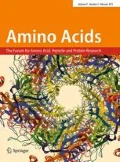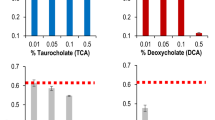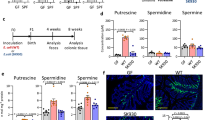Abstract
Recent studies have indicated that polyamines produced by gut microbes significantly influence host health; however, little is known about the microbial polyamine biosynthetic pathway except for that in Escherichia coli, a minor component of the gastrointestinal microbiota. Here, we investigated the polyamine biosynthetic ability of Bacteroides thetaiotaomicron, a predominant gastrointestinal bacterial species in humans. High-performance liquid chromatography analysis revealed that B. thetaiotaomicron cultured in polyamine-free minimal medium accumulated spermidine intracellularly at least during the mid-log and stationary phases. Deletion of the gene encoding a putative carboxyspermidine decarboxylase (casdc), which converts carboxyspermidine to spermidine, resulted in the depletion of spermidine and loss of decarboxylase activity in B. thetaiotaomicron. The Δcasdc strain also showed growth defects in polyamine-free growth medium. The complemented Δcasdc strain restored the spermidine biosynthetic ability, decarboxylase activity, and growth. These results indicate that carboxyspermidine decarboxylase is essential for synthesizing spermidine in B. thetaiotaomicron and contributes to the growth of this species.





Similar content being viewed by others
References
Degnan PH, Barry NA, Mok KC, Taga ME, Goodman AL (2014) Human gut microbes use multiple transporters to distinguish vitamin B12 analogs and compete in the gut. Cell Host Microbe 15:47–57. doi:10.1016/j.chom.2013.12.007
Deng X, Lee J, Michael AJ, Tomchick DR, Goldsmith EJ, Phillips MA (2010) Evolution of substrate specificity within a diverse family of β/α-barrel-fold basic amino acid decarboxylases: X-ray structure determination of enzymes with specificity for l-arginine and carboxynorspermidine. J Biol Chem 285:25708–25719. doi:10.1074/jbc.M110.121137
Driessen AJ, Smid EJ, Konings WN (1988) Transport of diamines by Enterococcus faecalis is mediated by an agmatine-putrescine antiporter. J Bacteriol 170:4522–4527
Eisenberg T et al (2009) Induction of autophagy by spermidine promotes longevity. Nat Cell Biol 11:1305–1314. doi:10.1038/ncb1975
Furuchi T, Kashiwagi K, Kobayashi H, Igarashi K (1991) Characteristics of the gene for a spermidine and putrescine transport system that maps at 15 min on the Escherichia coli chromosome. J Biol Chem 266:20928–20933
Goodman AL et al (2009) Identifying genetic determinants needed to establish a human gut symbiont in its habitat. Cell Host Microbe 6:279–289. doi:10.1016/j.chom.2009.08.003
Hamana K, Itoh T, Benno Y, Hayashi H (2008) Polyamine distribution profiles of new members of the phylum Bacteroidetes. J Gen Appl Microbiol 54:229–236. doi:10.2323/jgam.54.229
Hanfrey CC et al (2011) Alternative spermidine biosynthetic route is critical for growth of Campylobacter jejuni and is the dominant polyamine pathway in human gut microbiota. J Biol Chem 286:43301–43312. doi:10.1074/jbc.M111.307835
Herrero M, de Lorenzo V, Timmis KN (1990) Transposon vectors containing non-antibiotic resistance selection markers for cloning and stable chromosomal insertion of foreign genes in gram-negative bacteria. J Bacteriol 172:6557–6567
Hosoya R, Hamana K (2004) Distribution of two triamines, spermidine and homospermidine, and an aromatic amine, 2-phenylethylamine, within the phylum Bacteroidetes. J Gen Appl Microbiol 50:255–260. doi:10.2323/jgam.50.255
Kibe R et al (2014) Upregulation of colonic luminal polyamines produced by intestinal microbiota delays senescence in mice. Sci Rep 4:4548. doi:10.1038/srep04548
Koropatkin NM, Martens EC, Gordon JI, Smith TJ (2008) Starch catabolism by a prominent human gut symbiont is directed by the recognition of amylose helices. Structure 16:1105–1115. doi:10.1016/j.str.2008.03.017
Lee J, Sperandio V, Frantz DE, Longgood J, Camilli A, Phillips MA, Michael AJ (2009) An alternative polyamine biosynthetic pathway is widespread in bacteria and essential for biofilm formation in Vibrio cholerae. J Biol Chem 284:9899–9907. doi:10.1074/jbc.M900110200
Lee SM, Donaldson GP, Mikulski Z, Boyajian S, Ley K, Mazmanian SK (2013) Bacterial colonization factors control specificity and stability of the gut microbiota. Nature 501:426–429. doi:10.1038/nature12447
Matsumoto M, Kurihara S, Kibe R, Ashida H, Benno Y (2011) Longevity in mice is promoted by probiotic-induced suppression of colonic senescence dependent on upregulation of gut bacterial polyamine production. PLoS ONE 6:e23652. doi:10.1371/journal.pone.0023652
Matsumoto M et al (2012) Impact of intestinal microbiota on intestinal luminal metabolome. Sci Rep 2:233. doi:10.1038/srep00233
Michael AJ (2015) Biosynthesis of polyamines in eukaryotes, archaea, and bacteria. In: Kusano T, Suzuki H (eds) Polyamines: a universal molecular nexus for growth, survival, and specialized metabolism. Springer, Tokyo, p 3–14. doi:10.1007/978-4-431-55212-3_1
Miller-Fleming L, Olin-Sandoval V, Campbell K, Ralser M (2015) Remaining mysteries of molecular biology: the role of polyamines in the cell. J Mol Biol 427:3389–3406. doi:10.1016/j.jmb.2015.06.020
Noack J, Kleessen B, Proll J, Dongowski G, Blaut M (1998) Dietary guar gum and pectin stimulate intestinal microbial polyamine synthesis in rats. J Nutr 128:1385–1391
Noack J, Dongowski G, Hartmann L, Blaut M (2000) The human gut bacteria Bacteroides thetaiotaomicron and Fusobacterium varium produce putrescine and spermidine in cecum of pectin-fed gnotobiotic rats. J Nutr 130:1225–1231
Qin J et al (2010) A human gut microbial gene catalogue established by metagenomic sequencing. Nature 464:59–65. doi:10.1038/nature08821
Soda K, Dobashi Y, Kano Y, Tsujinaka S, Konishi F (2009) Polyamine-rich food decreases age-associated pathology and mortality in aged mice. Exp Gerontol 44:727–732. doi:10.1016/j.exger.2009.08.013
Tabor CW, Tabor H (1985) Polyamines in microorganisms. Microbiol Rev 49:81–99
Uda K, Tsujikawa T, Fujiyama Y, Bamba T (2003) Rapid absorption of luminal polyamines in a rat small intestine ex vivo model. J Gastroenterol Hepatol 18:554–559. doi:10.1046/j.1440-1746.2003.03020.x
Acknowledgments
We are grateful to Dr. Thomas J. Smith (Donald Danforth Plant Science Center, USA) and Dr. Nicole Koropatkin (University of Michigan Medical School, USA) for technical advice and for the kind gift of molecular genetic tools for B. thetaiotaomicron (B. thetaiotaomicron MS39 (Δtdk), pExchange-tdk, and pNBU2-bla-ermGb). We acknowledge Dr. Anthony J. Michael (University of Texas Southwestern Medical Center at Dallas, USA) for providing carboxyspermidine and for critically reading our manuscript. This study was supported by Grants-in-Aid from the Institute for Fermentation, Osaka (to K.T. and K.S.). We acknowledge National BioResource Project (NIG, Japan) for providing E. coli S17-1 λpir. We thank the Japan Collection of Microorganisms, RIKEN BRC, which is participating in the National BioResource Project of the MEXT, Japan for providing B. thetaiotaomicron JCM 5827T.
Author information
Authors and Affiliations
Corresponding author
Ethics declarations
Conflict of interest
The authors declare that they have no conflict of interest.
Ethical approval
This article does not contain any studies with human participants performed by any of the authors. B. thetaiotaomicron JCM 5827T, an isolate from human feces, was purchased from Japan Collection of Microorganisms, RIKEN BRC. B. thetaiotaomicron MS39 (Δtdk) is a gift from Dr. Thomas J. Smith at Donald Danforth Plant Science Center and Dr. Nicole Koropatkin at University of Michigan Medical School, and originated from the strain ATCC 29148T. This study was reviewed and approved by the Ethics Committee of Ishikawa Prefectural University.
Additional information
Handling Editor: E. Agostinelli.
Electronic supplementary material
Below is the link to the electronic supplementary material.
Rights and permissions
About this article
Cite this article
Sakanaka, M., Sugiyama, Y., Kitakata, A. et al. Carboxyspermidine decarboxylase of the prominent intestinal microbiota species Bacteroides thetaiotaomicron is required for spermidine biosynthesis and contributes to normal growth. Amino Acids 48, 2443–2451 (2016). https://doi.org/10.1007/s00726-016-2233-0
Received:
Accepted:
Published:
Issue Date:
DOI: https://doi.org/10.1007/s00726-016-2233-0




